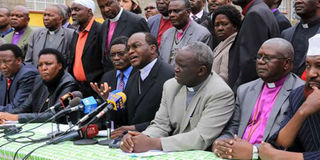Clerics appeal to Uhuru, Raila on IEBC talks

Religious leaders address a press conference at Little Daughters of St Joseph Retreat Centre in Karen, Nairobi, on May 27, 2016. They urged Cord to end the weekly anti-Independent Electoral and Boundaries Commission (IEBC) protests to pave the way for dialogue. PHOTO | JEFF ANGOTE | NATION MEDIA GROUP
What you need to know:
- The clerics, who have met Cord, the IEBC, and about 10 Jubilee leaders, asked President Kenyatta for a meeting.
- Cord, which has been leading anti-IEBC protests in Nairobi and other parts of the country for the last four weeks, called off next Monday’s protests in a bid to pave the way for dialogue.
Religious leaders on Friday asked President Uhuru Kenyatta to personally lead talks with Cord over the electoral commission, warning that time was running out for an amicable solution.
They also urged Cord to end the weekly anti-Independent Electoral and Boundaries Commission (IEBC) protests to pave the way for dialogue.
Similar calls were made by women leaders meeting in Nairobi, who warned that the protests were dividing Kenya along ethnic lines.
The clergy, led by the National Council of Churches of Kenya (NCCK) and Kenya Conference of Catholics Bishops (KCCB), spoke a day after President Kenyatta said although he was willing to discuss the IEBC issue, sacking the commissioners must be guided by the Constitution.
“We are concerned that the political grandstanding by the two main political formations is a threat to national peace, cohesion and unity,” Catholic, Evangelical, Protestant, Seventh Day Adventist, Muslim, Hindu and African Instituted Churches clerics said in a joint statement.
The statement was read in turns by NCCK Secretary-General Peter Karanja and the KCCB chairman, Bishop Philip Anyolo, flanked by about 30 other religious leaders.
The head of the Catholic Church, John Cardinal Njue, was at the press conference at the Little Daughters of St Joseph Retreat Centre in Karen, Nairobi.
The clerics, who have met Cord, the IEBC, and about 10 Jubilee leaders, asked President Kenyatta for a meeting.
On Thursday, the President told business leaders at State House, Nairobi, that the Constitution was clear on the removal of the IEBC commissioners.
“If you want to engage me on issues of the economy, issues of general politics, I am available. Anytime... But if you want to engage me on issues of the IEBC as I have stated, there is a process,” he said, adding that any talks must be structured and constitutional.
Cord, which has been leading anti-IEBC protests in Nairobi and other parts of the country for the last four weeks, called off next Monday’s protests in a bid to pave the way for dialogue.
Three people were killed in Kisumu and Siaya in this week’s demonstrations.
APPLY LAW
The religious leaders said the IEBC, the Jubilee coalition and Cord must tone down. “We believe an urgent political solution is required to avert a crisis that could complicate the next elections and plunge the country into violence,” they said.
They said the Jubilee team had shown interest in talks and they were ready to meet them.
“The IEBC has said it will not mind if a political solution that involves them going home is found, they are only against the mob lynching,” Canon Karanja said.
In Kakamega, Ford-Kenya leader Moses Wetang’ula urged the clergy to pressure Jubilee to talk, saying the opposition was ready for dialogue.
He said Cord was ready to name a team for the negotiations.
But speaking in Murang’a, Deputy President William Ruto said the President’s hands were tied by the Constitution.
He said the government was ready for dialogue through constitutional means.
Mr Ruto said religious leaders, civil society and any other Kenyan could present their views to Parliament, which will in turn pass the necessary laws on the IEBC.
Reports by Patrick Langat, Benson Amadala and Leopold Obi




